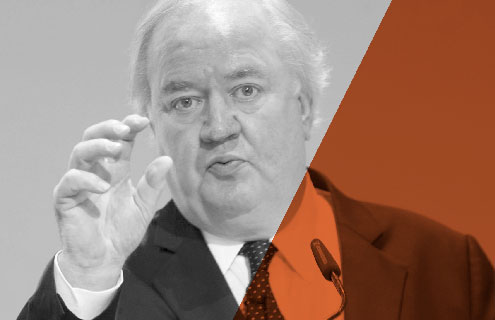This year’s European Insurance Forum, held in Dublin’s Croke Park on 25 May, focused on the challenges facing the industry, including Brexit and the changing tax landscape.
This year’s European Insurance Forum, held in Dublin’s Croke Park on 25 May, focused on the challenges facing the industry, including Brexit and the changing tax landscape.
The keynote speech of the day, Denis Kessler, chair of the board and CEO at SCOR Re, warned the more than 240 executives in attendance that they need to adapt in order to meet the challenges that lie ahead for the insurance and reinsurance industry.
Kessler likened the industry’s journey to an airplane’s flight path, along which it’s susceptible to headwinds, crosswinds and tailwinds.
The headwinds threatening the industry include macroeconomic uncertainties, low interest rates and financial regulation overload, while increased supply driving down prices is a worry for the reinsurance market.
Kessler said that the economic slowdown of the last 10 years has “hampered reinsurance and insurance industry demand”.
He noted that some sectors, such as oil and gas, in particular have suffered adverse developments, while investments in housing and infrastructure have declined.
Kessler said: “This combination of factors has resulted in a subdued insurance and reinsurance demand.”
He also discussed low interest rates. He noted that even though rates have increased in places recently, they still remain extremely low, especially in Europe. “This ultra low-yield environment has resulted in a strong decrease on the asset side of contributions to insurers and reinsurers’ bottom line.”
He then moved onto the ‘tailwinds’, with examples including the expansion of the the risk universe and major protection gaps.
Discussing the expanding risk universe, Kessler suggested that while traditional risks remain, new risks are emerging or transforming, and increasingly complex interdependencies are drawn between them. He said: “The insurability frontier needs to be pushed further for this risk universe expansion to be a true tailwind.”
Finally, Kessler touched on the ‘crosswinds’ of the industry, including disruption, suggesting that some developments have raised questions about the relevance of the traditional insurance and reinsurance model.
Kessler suggested that insurance and reinsurance need to cope with disruptions by adapting, innovating and transforming to meet developments. He posed the question: “Will insurance and reinsurance transform to adapt to the digital revolution, or will some new entrants disrupt the sector and create a new insurance model, thereby replacing age-old incumbents which have failed to adapt?”
One of the headwinds currently challenging captive insurance in particular is the Organisation for Economic Co-operation and Development’s (OECD) crackdown on base erosion and profit shifting (BEPS), which is causing a number of issues for captive insurance companies.
Praveen Sharma, global practice leader of insurance regulatory and tax consulting at Marsh, pointed to BEPS Action 3 as likely to cause problems for multinational companies that own captives in Europe.
Action 3 sets out recommendations to strengthen the rules for the taxation of controlled foreign corporations (CFC).
The rules are anti-avoidance provisions designed to prevent diversion of UK profits to low-tax territories. If UK profits are diverted to a CFC, those profits are apportioned and charged on a UK corporate interest-holder that holds at least a 25 percent interest in the CFC.
He said: “As Ireland doesn’t have CFC legislation at the moment, and will be implementing one, it will be interesting to see how the EU will change the CFC legislation towards captives.”
Action 7, which contains changes to the definition of ‘permanent establishment’ to prevent artificial circumvention, is also likely to challenge captives. Sharma suggested that the definition for ‘permanent establishment’ needs to be clarified for the insurance industry because of the way the service is sold and distributed.
He said: “There are a lot of grey areas here and there are a lot of key fundamental issues for the insurers that are going to affect their infrastructure, performance, ratings, capital and pricing.”
Jefferson VanderWolk, head of the tax treaty, transfer pricing and financial transactions division at the OECD, insisted that the action was designed as an anti-avoidance measure.
He said: “Action 7 is not intended to cause a major change. It was designed to reverse the result of decisions made by commissionaires for sales in countries such as France and Norway. As an example, a seller of tangible goods will no longer be able to hide behind the commissionaire’s structure and pay no tax there.”
VanderWolk informed attendees that, although much has been achieved around the BEPS initiative over the last two years, there is a lot of work still to be done.
Another ongoing topic of discussion is Brexit. Gerry Cross, director of policy and risk for the Central Bank of Ireland, spoke on the challenges this poses for the single market in financial services.
Cross said: “[Brexit] will undoubtedly change the configuration of the EU insurance market: the UK insurance industry is the largest in Europe with considerable levels of cross-border activity.”
As a result of Brexit, some financial services providers have already begun the process of relocating from London to a remaining EU member state.
According to Cross, the Central Bank of Ireland has seen a high level of interest and engagement from financial firms that are exploring the possibility of relocating their operations to the EU member state of Ireland.
Cross said: “We have had enquiries from very many firms of many different types. Engagement is currently ongoing with a large number of such firms. The picture is similar across the different sectors.”
“Take, for example, the question of substance, which relates to how much presence a firm needs to have in an EU jurisdiction in order to be authorised there.”
“The question matters because unless a firm is actually running the authorised business from the EU jurisdiction where it is authorised, then the business is being run, and effectively, as a result, being supervised, elsewhere.”
“And we want to avoid firms doing business in the EU when they are not in fact subject to EU standards and requirements.”
Cross added: “The risk of divergence on this question has been a real one. This is why we have been very pleased to see a significant amount of work being undertaken by the European authorities in this regard.”
Concluding his speech, Cross said the Central Bank of Ireland has seen “real and important progress” that will make firms less likely making their relocation decisions based on regulatory or supervisory comparisons.





